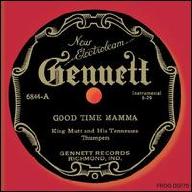After that, it becomes rather muddled, as Jimmy Blythe is credited as composer of some of the King Mutt numbers and in the past Blythe was regarded as a pianist. However, the ledger also shows that pianist Frank Melrose recorded some solos during this session. As it stands, the ill-heard pianist on the King Mutt sides could be either Blythe or Melrose, and so the piano is regarded as having been played by either musician -- or both. The same situation is held concerning the drums. Both Jimmy Bertrand and Tommy Taylor are given as possible, and both were present at a slightly later Brunswick session, credited to the Kansas City Tin Roof Stompers, that included a tune, Aunt Jemima Stomp, that is identical to Shake Your Shimmy as recorded by King Mutt, although Bertrand played xylophone on the Tin Roof Stompers date. Another possible connection to the Tin Roof Stompers is that the rejected St. Louis Bound was in fact recorded by that group, but Junie Cobb is identified as the cornetist there and, apart from Bertrand and Taylor, none of the other members appears to have been the same.
There is also a guitarist present, barely audible; the books show that obscure blues singer Willie Baker recorded some tunes that day, none of which were issued until they were later remade. However, according to the ledgers, Baker was in and out of the Gennett studios several times between January and March trying to make records Gennett would pass. On one of Al Miller's solo records, the guitar accompanist is listed only as "...Rodgers" and perhaps it is he rather than Baker -- there's no real way of telling. The drums in the Gennett Electrobeam recording are extremely loud and boomy for a date from the 1920s; they pack a lot of punch, but also tend to obscure the other rhythm players. No one has developed a proposal as to who plays saxophone on the date; perhaps this was "King Mutt?"
In terms of style, the King Mutt sides are extremely primitive and only very loosely arranged, if at all. Solos come and go with no rhyme or reason, ensemble breaks are spontaneous, and the feeling of everything on the date is that of a free-for-all. Given that the King Mutt sides were the product of a group made up of a loose confederation of jazz and blues players, in a way the aggregation can be regarded as a kind of predecessor to groups like the Harlem Hamfats, far more common in the 1930s. As such, King Mutt His Tennessee Thumpers appear to be fairly unique among the various small bands that recorded in the 1920s. ~ Uncle Dave Lewis, Rovi












